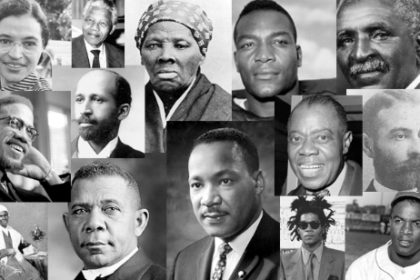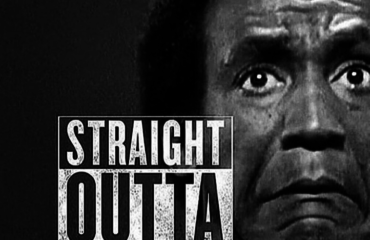54 Famous Black History Month African Americans


Researching facts for black history month can be a daunting task at times. There is so much information available online, but it all seems to be scattered around.
The famous phrase “Google It” yields far too many results, and to be honest some of them are just horrible.
So, I put together a list of black historical figures. This list of famous African Americans is a quick reference guide.
Kids and other researchers can scan this page for facts fast. Learn about black men and women that changed the world in their own unique way.
Use it for little known black history facts or to build up resources for something else. Thanks to the dates at a glance, timelines are a cinch to put together.
Google has done most of the work for you. I just put the information on one page for your convenience. Some of the most influential black leaders and inventors are on the list.
Other websites used in conjunction with this page will keep you current in black history. Take your time with the list to find out why today in black history we are still celebrating these icons.
54 Influential People For Black History Month
1. Adam Clayton Powell Jr.

(Nov. 29, 1908 – April 4, 1972)
He was the first person of African-American descent to be elected from New York to Congress. In 1961, after sixteen years in the House, Powell became chairman of the Education and Labor Committee, the most powerful position held by an African American in Congress. (read more)
2. Alex Haley

(August 11, 1921 – February 10, 1992)
Alex was an American writer known as the author of the 1976 book Roots: The Saga of an American Family. (read more)
Alex Haley Books
- Roots: The Saga of an American Family
- The Autobiography of Malcolm X
- Queen: The Story of an American Family
- A different kid of Christmas
- Mama Flora’s Family
3. Angela Davis

She emerged as a prominent counterculture activist and radical in the 1960s as a leader of the Communist Party USA, and had close relations with the Black Panther Party through her involvement in the Civil Rights Movement. (read more)
Angela Yvonne Davis Books
- Women, Race and Class
- Angela Davis: An Autobiography
- The Meaning of Freedom
- Women, Culture and Politics
- Blues Legacies and Black Feminism
4. Anna Murray-Douglass

(1813 – August 4, 1882)
She was an American abolitionist and member of the Underground Railroad. Anna was the first wife of Frederick Douglas. (read more)
5. Annie Malone

(August 9, 1869 – May 10, 1957)
Annie Minerva Turnbo Malone was an American businesswoman, inventor and philanthropist. In the first three decades of the 20th century, she founded and developed a large and prominent commercial and educational enterprise centered on cosmetics for African-American women. (read more)
- Developed her own line of hair care products
- Sold “Wonderful Hair Grower” for to door
- 1920 was a multi-millionaire from her cosmetics
6. Barack Hussein Obama II

(First Black President)
The 44th President of the United States, the first African American to hold the office. Assumed office on January 20th 2009. (read more)
7. Benjamin Banneker

(November 9, 1731 – October 9, 1806)
Banneker’s knowledge of astronomy helped him author a commercially successful series of almanacs. He corresponded with Thomas Jefferson, drafter of the United States Declaration of Independence, on the topics of slavery and racial equality. Abolitionists and advocates of racial equality promoted and praised his works. (read more)
8. Bessie Coleman

(January 26, 1892 – April 30, 1926)
She was an American civil aviator. She was the first female pilot of African American descent and is also the first Native American woman to hold a pilot license. (read more)
9. Bessie Smith

(April 15, 1894 – September 26, 1937)
Nicknamed The Empress of the Blues, Smith was the most popular female blues singer of the 1920s and 1930s. She is often regarded as one of the greatest singers of her era and, along with Louis Armstrong, a major influence on other jazz vocalists. (read more)
10. Booker T. Washington

(April 5, 1856 – November 14, 1915)
He was an African-American educator, author, orator, and advisor to presidents of the United States. Between 1890 and 1915, Washington was the dominant leader in the African-American community. (read more)
Frederick Douglas Books
- Up from Slavery
- Character Building
- The Negro Problem
11. Carter G. Woodson

(December 19, 1875 – April 3, 1950)
He was an African-American historian, author, journalist and the founder of the Association for the Study of African American Life and History. Woodson was one of the first scholars to study African-American history. A founder of The Journal of Negro History in 1915, Woodson has been cited as the father of black history. (read more)
Carter Godwin Woodson Books
- The Mis-Education of the Negro
- The history of the Negro church
- A Century of Negro Migration
- The Negro in our history
12. Charles Alston

(November 28, 1907 – April 27, 1977)
Charles was an African-American painter, sculptor, illustrator, muralist and teacher who lived and worked in the New York City neighborhood of Harlem. Alston was active in the Harlem Renaissance; Alston was the first African-American supervisor for the Works Progress Administration’s Federal Art Project.
13. Charles Hamilton Houston

(Sept. 3, 1895 – April 22, 1950)
Charles was a prominent African-American lawyer, Dean of Howard University Law School, and NAACP Litigation Director who played a significant role in dismantling the Jim Crow laws, which earned him the title “The Man Who Killed Jim Crow”. (read more)
14. David Walker

(September 28, 1796 – August 6, 1830)
David was an outspoken African-American abolitionist and anti-slavery activist. In 1829, while living in Boston, Massachusetts, he published An Appeal to the colored Citizens of the World, a call for black unity and self-help in the fight against oppression and injustice.
15. Denmark Vesey

(1767 – July 2, 1822)
A skilled carpenter, Vesey had won a lottery and purchased his freedom at age 32 in 1799. He had a good business and a family, but was unable to buy his first wife Beck and their children out of slavery. (read more)
16. Elijah McCoy

(May 2, 1844 – October 10, 1929)
Elijah McCoy was a 19th century African-American inventor best known for inventing lubrication devices used to make train travel more efficient. (read more)
17. Elijah Muhammad

(born Elijah Robert Poole; October 7, 1897 – February 25, 1975)
Elijah rose from poverty to become the charismatic leader of the black nationalist group Nation of Islam, and mentor of Malcolm X and Louis Farrakhan. (read more)
Elijah Muhammad Books
- Message to the Blackman in America
- How to Eat to Live
- The theology of time
- The Fall of America
- Our Savior Has Arrived
18. Frederick Douglass

(February 1818 – February 20, 1895)
Douglass wrote several autobiographies. He described his experiences as a slave in his 1845 autobiography, Narrative of the Life of Frederick Douglass, an American Slave, which became a bestseller, and was influential in promoting the cause of abolition, as was his second book, My Bondage and My Freedom (1855). (read more)
- Narrative of the Life of Frederick Douglas
- My Bondage and My Freedom
19. Ella Baker

(December 13, 1903 – December 13, 1986)
Ella was an African-American civil rights and human rights activist. She was a largely behind-the-scenes organizer whose career spanned over five decades. (read more)
20. Garrett Morgan

(March 4, 1877 – July 27, 1963)
Morgan was born in Claysville, an African-American community outside of Paris, Kentucky, to Sydney Morgan, a son and former slave of Confederate Colonel John H. Morgan (of Morgan’s Raiders fame), and Eliza Reed, also a former slave who was half Native American and daughter of Rev. Garrett Reed. (read more)
21. George Washington Carver

(1860 – 5 January 1943)
Carver was born into slavery in Diamond Grove, Newton County, near Crystal Place, now known as Diamond, Missouri, possibly in 1864 or 1865, though the exact date is not known. (read more)
22. Granville Woods

(April 23, 1856 – January 30, 1910)
Woods developed several improvements to the railroad system, and was referred to by some as the “Black Edison. (read more)
23. Hattie McDaniel

(June 10, 1895 – October 26, 1952)
Hattie McDaniel was born June 10, 1895, in Wichita, Kansas, to former slaves. She was the youngest of 13 children. Her father, Henry McDaniel, fought in the Civil War with the 122nd USCT and her mother, Susan Holbert, was a singer of religious music. (read more)
24. Harriet Tubman

(born Araminta Ross; c. 1822 – March 10, 1913)
Tubman was born Araminta “Minty” Ross to slave parents, Harriet (“Rit”) Green and Ben Ross. Rit was owned by Mary Pattison Brodess (and later her son Edward). (read more)
25. Henry Highland Garnet

(December 23, 1815 – February 13, 1882)
Henry Garnet was born into slavery in New Market, Kent County, Maryland, on December 23, 1815. According to James McCune Smith, Garnet’s father was George Trusty and his mother was a woman of “extraordinary energy.” (read more)
26. Hiram Rhodes Revels

(September 27, 1827 – January 16, 1901)
Revels was born free in Fayetteville, North Carolina, to free people of color, parents of African and European ancestry. He was tutored by a black woman for his early education. In 1838 he went to live with his older brother, Elias B. Revels, in Lincolnton, North Carolina, and was apprenticed as a barber in his brother’s shop. (read more)
27. Ida B. Wells

(July 16, 1862 – March 25, 1931)
Ida Bell Wells was born into slavery in Holly Springs, Mississippi in 1862, just before United States President Abraham Lincoln issued the Emancipation Proclamation. Her parents were James Wells and Elizabeth “Lizzie” (Warrenton) Wells. (read more)
Books
28. Jack Johnson

(March 31, 1878 – June 10, 1946)
Johnson was born the third child of nine, and the first son, of Henry and Tina “Tiny” Johnson, two former slaves who worked blue collar jobs as a janitor and a dishwasher to support their children and put them through school. (read more)
Books
29. Jackie Robinson

(January 31, 1919 – October 24, 1972)
Robinson was born on January 31, 1919, into a family of sharecroppers in Cairo, Georgia. He was the youngest of five children born to Mallie (McGriff) and Jerry Robinson, after siblings Edgar, Frank, Matthew (nicknamed “Mack”), and Willa Mae. (read more)
30. John H. Johnson

(January 19, 1918 – August 8, 2005)
Johnson was born in rural Arkansas City, Arkansas, the grandson of slaves. When he was eight years old, his father died in a sawmill accident and Johnson was raised by his mother and stepfather. (read more)
31. James Baldwin

(August 2, 1924 – December 1, 1987)
Baldwin was born after his mother, Emma Berdis Jones, left his biological father for drug abuse and moved to Harlem, New York City. There, she married a preacher, David Baldwin. The family was very poor. (read more)
Books
32. John Mercer Langston

(December 14, 1829 – November 15, 1897)
John Mercer Langston was born free in 1829 in Louisa County, Virginia, the youngest of a daughter and three sons of Lucy Jane Langston, a freedwoman of mixed African and Native American descent, and Ralph Quarles, a white planter. (read more)
33. Langston Hughes

(February 1, 1902 – May 22, 1967)
Both of Hughes’ paternal great-grandmothers were African-American and both of his paternal great-grandfathers were white slave owners of Kentucky. (read more)
Books
34. Madam C. J. Walker

(December 23, 1867 – May 25, 1919)
In January 1906, Sarah married Charles Joseph Walker, a newspaper advertising salesman she had known in Missouri. Through this marriage, she become known as Madam C. J. Walker. (read more)
35. Mae C. Jemison

Mae Carol Jemison was born in Decatur, Alabama, on October 17, 1956, the youngest child of Charlie Jemison and Dorothy Green. (read more)
Books
- Find Where The Wind Goes
- The 100 Year Starship
- Journey Through Our Solar System
- Exploring Our Sun
- Discovering New Planets
36. Maggie L. Walker

(July 15, 1864 – December 15, 1934)
Walker was born as Maggie Lena Mitchell in Richmond, Virginia, to Eccles Cuthbert and Elizabeth Draper Mitchell two years and two months after the end of the American Civil War. (read more)
37. Malcolm X (May 19, 1925 – February 21, 1965)

Malcolm Little was born May 19, 1925, in Omaha, Nebraska, the fourth of seven children of Grenada-born Louise Helen Little (née Norton) and Georgia-born Earl Little. (read more)
38. Marcus Garvey

(17 August 1887 – 10 June 1940)
Marcus Mosiah Garvey, Jr. was born as the youngest of eleven children in St. Ann’s Bay, Jamaica, to Marcus Mosiah Garvey, Sr., a mason, and Sarah Jane Richards, a domestic worker. (read more)
Books
39. Maria W. Stewart

(1803 – February 6, 1880)
She was born Maria Miller, the child of free African-American parents in Hartford, Connecticut, in 1803. At the age of five Maria lost both parents and was sent to live with a minister and his family. (read more)
40. Martin Luther King, Jr.

(January 15, 1929 – April 4, 1968)
King was born on January 15, 1929, in Atlanta, Georgia, to Reverend Martin Luther King, Sr., and Alberta Williams King.
Martin became a civil rights activist early in his career. He led the 1955 Montgomery Bus Boycott and helped found the Southern Christian Leadership Conference (SCLC) in 1957, serving as its first president. (read more)
41. Mary McLeod Bethune – (July 10, 1875 – May 18, 1955)

Mary Jane McLeod was born in 1875 in a small log cabin near Mayesville, South Carolina, on a rice and cotton farm in Sumter County. She was the fifteenth of seventeen children born to Sam and Patsy (McIntosh) McLeod, both former slaves. (read more)
42. Maya Angelou

(April 4, 1928 – May 28, 2014)
Marguerite Annie Johnson was born in St. Louis, Missouri, on April 4, 1928, the second child of Bailey Johnson, a doorman and navy dietitian, and Vivian (Baxter) Johnson, a nurse and card dealer. (read more)
Books
43. Muhammad Ali

(Professional Boxer)
Cassius Marcellus Clay Jr. was born on January 17, 1942, in Louisville, Kentucky. The older of two boys, he was named for his father, Cassius Marcellus Clay Sr., who himself was named in honor of the 19th century abolitionist and politician of the same name. (read more)
44. Nat Turner

(October 2, 1800 – November 11, 1831)
Born into slavery on October 2, 1800, in Southampton County, Virginia, his name was recorded as “Nat” by Benjamin Turner, the man who enslaved him and when Benjamin Turner died in 1810 Nat became the property of Benjamin’s brother Samuel Turner. (read more)
45. Nelson Mandela

(18 July 1918 – 5 December 2013)
Mandela was born on 18 July 1918 in the village of Mvezo in Umtata, then a part of South Africa’s Cape Province. Given the forename Rolihlahla, a Xhosa term colloquially meaning “troublemaker”, in later years he became known by his clan name, Madiba. (read more)
46. Otis Boykin

(August 29, 1920, Dallas, Texas – March 13, 1982, Chicago, Illinois)
47. Phillis Wheatley

(1758 – December 5, 1784)
Although the date and place of her birth are not documented, scholars believe that Phillis Wheatley was born in 1753 in West Africa, most likely in present-day Gambia or Senegal. (read more)
48. Rosa Parks

(February 4, 1913 – October 24, 2005)
Rosa Parks was born Rosa Louise McCauley in Tuskegee, Alabama, on February 4, 1913, to Leona (née Edwards), a teacher, and James McCauley, a carpenter. (read more)
49. Sojourner Truth

(1797 – November 26, 1883)
Truth was one of the ten or twelve children born to James and Elizabeth Baumfree (or Bomefree). (read more)
50. Shirley Chisholm

(November 30, 1924 – January 1, 2005)
Shirley Anita St. Hill was born on November 30, 1924, in Brooklyn, New York, to immigrant parents from the Caribbean region. She had three younger sisters, two born within three years after Shirley, one later. (read more)
51. Stokely Carmichael

(June 29, 1941 – November 15, 1998)
Born in Port of Spain, Trinidad and Tobago, Stokely Carmichael moved to Harlem, in New York, New York, in 1952 at the age of eleven, to rejoin his parents. (read more)
52. Thurgood Marshall

(July 2, 1908 – January 24, 1993)
Marshall was born in Baltimore, Maryland, on July 2, 1908. He was the great-grandson of a slave who was born in the modern-day Democratic Republic of the Congo; his grandfather was also a slave. (read more)
53. W. E. B. Du Bois

(William Edward Burghardt)
William Edward Burghardt Du Bois was born on February 23, 1868, in Great Barrington, Massachusetts, to Alfred and Mary Silvina (née Burghardt) Du Bois. Mary Silvina Burghardt’s family was part of the very small free black population of Great Barrington and had long owned land in the state. (read more)
54. Zora Neale Hurston

(January 7, 1891 – January 28, 1960)
She was born in Notasulga, Alabama, on January 7, 1891, where her father grew up and her grandfather was the preacher of a Baptist church. (read more)
Black history month is important not just to black people, but American people. It’s not just celebrated by African Americans. Fortune 500 companies and large organizations now recognize the month of February for blacks. It’s been a long road to get to where we are now and it’s only getting better.
How Did Black History Month Begin?
Black History Month began as “Negro History Week,” which was created in 1926 by Carter G. Woodson, a noted African American historian, scholar, educator, and publisher. It became a month-long celebration in 1976. The month of February was chosen to coincide with the birthdays of Frederick Douglass and Abraham Lincoln.
Pictures To Grab For Posting On Social Media














